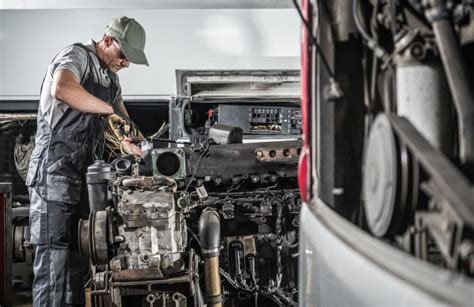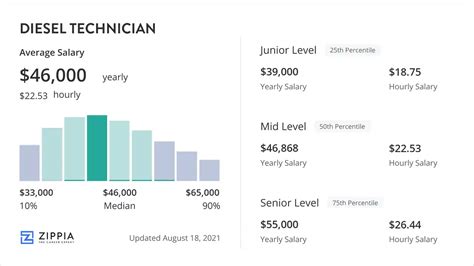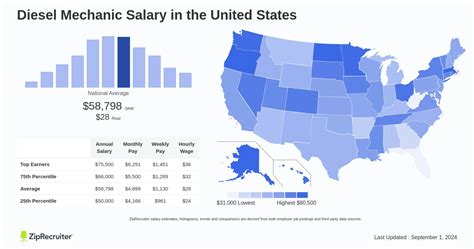If you have a passion for powerful engines and a knack for complex problem-solving, a career as a diesel technician is one of the most stable and rewarding paths in the skilled trades. These professionals are the backbone of our economy, keeping trucks, buses, construction equipment, and power generators running smoothly. But beyond job satisfaction, what can you expect to earn?
The financial prospects are strong. While a typical median salary for a diesel technician hovers around $59,000 per year, many factors can push that figure significantly higher, with experienced and specialized technicians earning upwards of $80,000 annually.
This guide will break down everything you need to know about a diesel technician's salary, from average pay to the key factors that will maximize your income.
What Does a Diesel Technician Do?

Often called diesel mechanics, diesel service technicians are expert diagnosticians and mechanics for vehicles and equipment powered by diesel engines. Their work is a sophisticated blend of hands-on repair and high-tech analysis.
Key responsibilities include:
- Inspecting and Diagnosing: Using advanced diagnostic software to pinpoint malfunctions in engines, transmissions, and electrical systems.
- Repairing and Replacing: Performing major and minor repairs, from rebuilding engines to replacing brake systems.
- Performing Routine Maintenance: Conducting preventative maintenance like oil changes, fluid checks, and filter replacements to prevent future breakdowns.
- Adhering to Regulations: Ensuring all work complies with federal and state vehicle requirements, especially regarding emissions.
They work on everything from Class 8 semi-trucks and city buses to bulldozers, cranes, and agricultural machinery.
Average Diesel Technician Salary

When analyzing salary, it's essential to look at multiple data points to get a complete picture. The most authoritative source, the U.S. Bureau of Labor Statistics (BLS), provides a comprehensive overview.
According to the BLS Occupational Outlook Handbook, the median annual wage for diesel service technicians and mechanics was $58,970 in May 2023. This means half of all technicians earned more than this amount, and half earned less. The median hourly wage was $28.35.
However, a "median" salary doesn't tell the whole story. A technician's earnings can vary widely based on their career stage:
- The lowest 10 percent (typically entry-level positions) earned less than $40,110.
- The highest 10 percent (representing senior or master technicians) earned more than $81,870.
Data from reputable salary aggregators often reflects a similar or slightly higher range, incorporating real-time job listings. For instance, Salary.com frequently places the median salary in the $60,000 to $65,000 range, while Payscale reports that top-earning diesel mechanics can make up to $37 per hour or more.
Key Factors That Influence Salary

Your specific salary will depend on a combination of factors. By focusing on these areas, you can strategically increase your earning potential throughout your career.
### Level of Education
While you can enter the field with a high school diploma and on-the-job training, formal education gives you a significant edge. Employers value candidates who have a solid theoretical foundation, which often translates to a higher starting salary and faster advancement.
- Vocational Certificate: A postsecondary certificate program (typically one year) provides core knowledge and hands-on skills, making you a more attractive hire.
- Associate's Degree: A two-year associate's degree in diesel technology offers a more in-depth curriculum, covering advanced diagnostics, electronics, and hydraulics. Graduates are highly sought after for dealership and fleet maintenance roles.
- Certifications: Industry certifications are a powerful tool for salary negotiation. The most recognized are from the National Institute for Automotive Service Excellence (ASE). Earning ASE certifications in areas like Diesel Engines (T2), Drivetrain (T3), and Electronic Systems (T6) proves your expertise and directly correlates with higher pay.
### Years of Experience
Experience is arguably the single most important factor in a technician's pay. As you gain hands-on skills and the ability to diagnose complex problems efficiently, your value to an employer skyrockets.
- Entry-Level (0-2 years): In this phase, you are learning the ropes and assisting senior technicians. Salaries typically fall in the $40,000 to $52,000 range.
- Mid-Career (3-9 years): With several years of experience, you can work independently and tackle most repairs. Your salary will likely be near or above the national median, in the $55,000 to $70,000 range.
- Senior/Master Technician (10+ years): With a decade or more of experience and multiple ASE Master certifications, you are an expert. You may take on a supervisory role, train junior technicians, or specialize in the most complex diagnostics. Top-tier earners in this category regularly command salaries of $75,000 to $90,000+.
### Geographic Location
Where you work matters. Salaries for diesel technicians vary significantly by state and even by metropolitan area due to differences in demand and cost of living.
According to BLS data, the top-paying states for diesel technicians include:
1. Alaska: Average annual salary of $78,820
2. District of Columbia: Average annual salary of $77,530
3. Hawaii: Average annual salary of $76,960
4. Washington: Average annual salary of $73,590
5. California: Average annual salary of $70,730
States with a lower cost of living or less demand for heavy-duty transport may offer salaries below the national median. Working in a major metropolitan area with a shipping port, distribution centers, or significant construction activity will almost always offer higher pay than a rural location.
### Company Type
The type of company you work for directly impacts your pay and benefits package. The BLS highlights the median annual wages across different sectors:
- Wholesale Trade: $65,300
- Local Government (excluding education and hospitals): $64,480
- Truck Transportation: $58,540
- Automotive Repair and Maintenance: $52,380
Working for a commercial truck dealership (e.g., Freightliner, Peterbilt, Volvo) often provides access to manufacturer-specific training and higher pay scales. Large fleet maintenance shops (like those for UPS, FedEx, or Walmart) offer excellent job security, benefits, and competitive wages.
### Area of Specialization
All diesel engines are not created equal. Developing expertise in a specific, high-demand niche can make you an indispensable asset and boost your income.
- Heavy-Duty Trucks (Class 8): This is the most common specialty and offers steady demand.
- Construction & Heavy Equipment: Technicians certified to work on brands like Caterpillar or John Deere are highly valued.
- Marine Diesel Engines: This is a lucrative specialty that requires unique skills to service engines on ships, yachts, and commercial vessels.
- Power Generation: Diesel generators are critical for hospitals, data centers, and other essential facilities. Technicians specializing in their repair and maintenance are well-compensated.
- Agricultural Equipment: In farming regions, technicians who can service complex combines, tractors, and harvesters are always in demand.
Job Outlook

The future for diesel technicians is bright and stable. The BLS projects that employment for diesel service technicians will grow by 4 percent from 2022 to 2032, which is about as fast as the average for all occupations.
This will result in an average of 19,800 job openings each year over the decade. This demand is driven by two main factors:
1. The need to maintain and repair the nation's existing fleet of diesel trucks and equipment.
2. A significant number of older technicians are expected to retire, creating vacancies for newly trained professionals to fill.
As diesel engine technology becomes cleaner and more complex, employers will continue to seek well-trained, certified technicians who can keep pace with innovation.
Conclusion

A career as a diesel technician offers a clear path to a secure and prosperous future. While the national median salary provides a solid benchmark, your individual earning potential is largely in your hands.
To maximize your salary, focus on these key takeaways:
- Invest in Formal Education: A certificate or associate's degree will set you apart.
- Pursue Certifications: ASE certifications are your proof of expertise and a direct lever for higher pay.
- Gain Diverse Experience: The more systems and vehicle types you can master, the more valuable you become.
- Consider Relocating: If you are mobile, moving to a high-demand, high-paying state can significantly boost your income.
- Never Stop Learning: Specializing in advanced diagnostics, electronics, or a specific type of equipment will cement your status as a top-tier earner.
For those with a strong work ethic and a passion for technology, the road ahead as a diesel technician is paved with opportunity.
